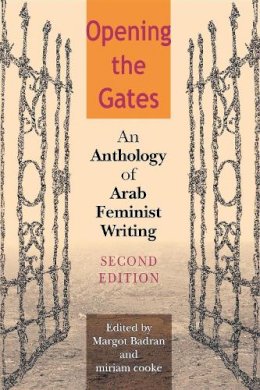Margot Badran is Edith Kreeger Wolf Distinguished Visiting Professor of Religion and Preceptor at the Institute for the Study of Islamic Thought in Africa at Northwestern University. Her books include Feminists, Islam, and Nation: Gender and the Making of Modern Egypt, as well as Harem Years: The Memoirs of an Egyptian Feminist: Huda Shaarawi, which she translated, edited, and introduced. Her permanent residence is in Cairo, Egypt. miriam cooke is Professor of Arabic Literature and Culture and Chair of the Department of Asian and African Languages and Literature at Duke University. Among her publications are War's Other Voices: Women Writers on the Lebanese Civil War; Women and the War Story; Women Claim Islam: Creating Islamic Feminism through Literature; and a novel, Hayati, My Life. She lives in Durham, North Carolina.
"In this second edition of their anthology, Badran (Northwestern Univ.) and Cooke (Duke Univ.) make available not only the materials that appeared in the 1990 volume but also material written in the decade since. The first edition included some 60 contributions from women across the Arab world, materials representing a century and a half of engagement with women's issues. At a time when the term feminism was still controversial, both in Euro-America and the Middle East, Badran and Cooke emphasized its relevance to Arab women's stories. The original volume was organized according to stages or levels of feminism—with sections titled Awareness, Rejection, Activism—and included poetry, fiction, pamphlets, and public statements. Each document was prefaced with a bio-bibliographical account of its author/s. The present edition retains these features but adds a fourth section, Transitions, which includes similar documents from the 1990s—documents bearing witness to the changes wrought during the decade, both regionally and globally, and their consequences for Arab women's lives at home and in the public sphere. Libraries that do own the previous volume will certainly want this one. Summing Up: Highly recommended. Upper-division undergraduates and graduate students.April 2005"—B. Harlow, University of Texas at Austin ". . .On finishing this book—the reader can only feel grateful to the editors who have offered her or him this wonderful chance to discover many silenced and veiled voices and who have opened the gates to so many unknown territories. The various texts document the movement of feminisms in the Arab world, proving wrong the common fallacy that Arab women lack awareness of their own rights, and that they have therefore been necessarily influenced and initiated into action by western feminists. This influence, though not denied here, is not exaggerated either."— "As a result, reading this book is a must for anyone interested in feminist studies or gender issues in general, whether a scholar or a member of a broader audience. The book is also very timely as it highlights a new stage in the development of feminisms in Arab societies, and it gets us past divisive or degrading stereotypes that freeze off genuine communication and allow a more positive and accurate image to be built."—Ahram Weekly online

